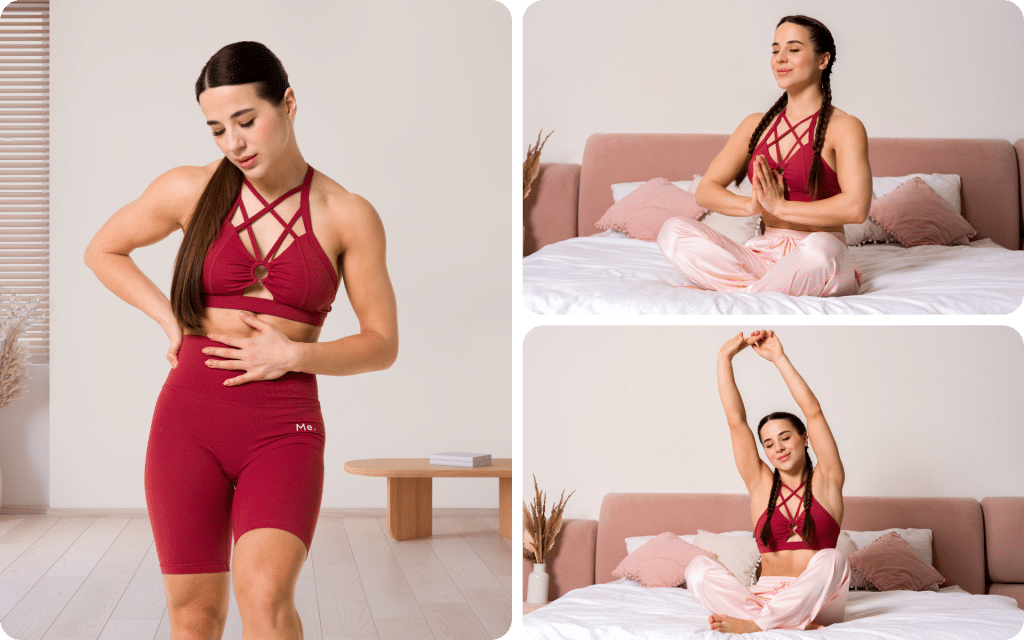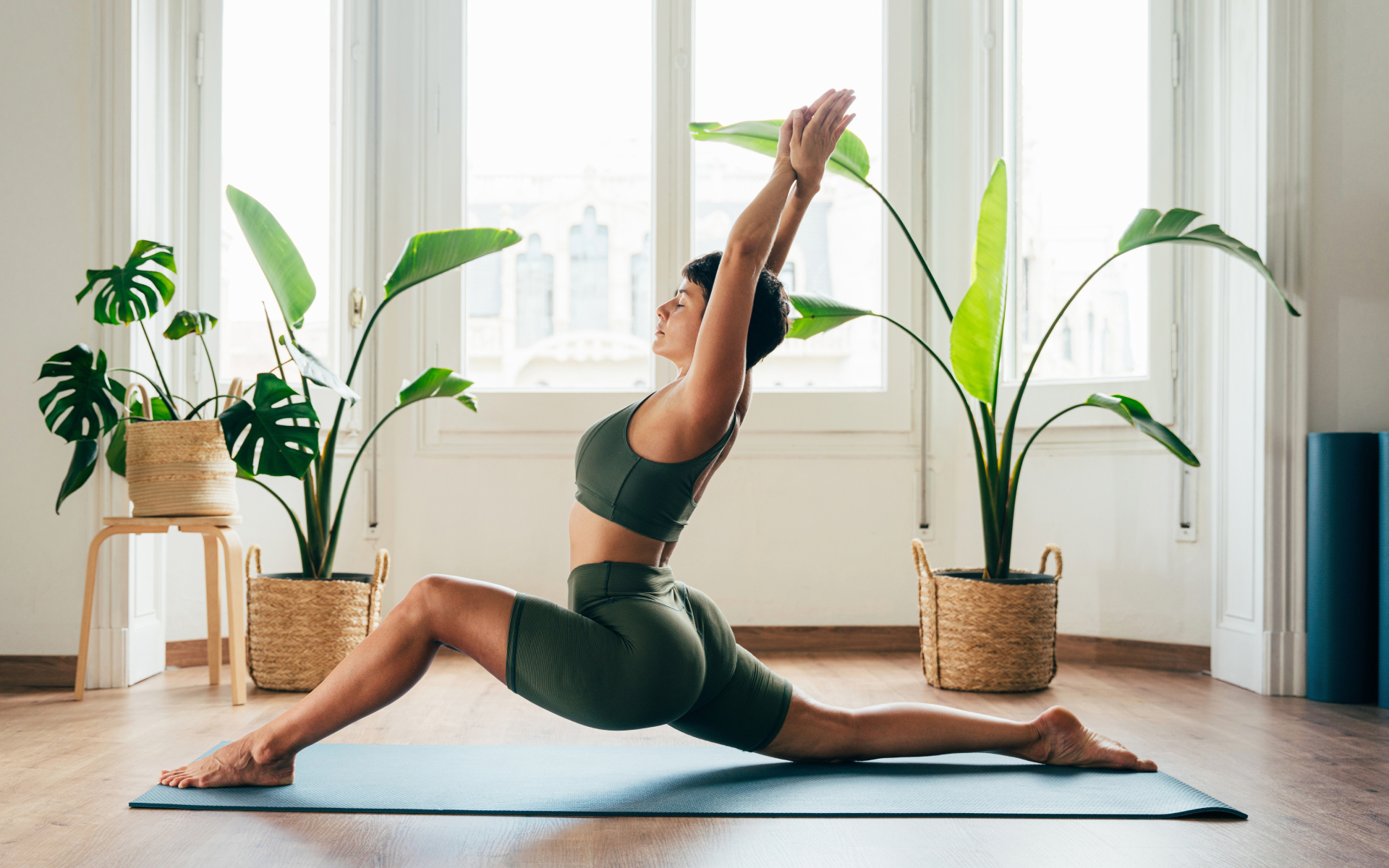Let’s talk about sex and intimacy during menstruation. For some, it’s an awkward subject, while for others, it’s a natural part of life. Either way you see it, one thing is for certain: your period doesn’t have to hit pause on connection, comfort, or pleasure. Whether you’re in a committed relationship or focusing on self-love, there are plenty of ways to navigate this phase with confidence, care, and a little creativity.
Our guide dives into what’s happening in your body during menstruation, how hormones affect your mood and desires, and tips for embracing intimacy with your partner or yourself. But first, let’s understand what exactly is happening to your body during this phase of the cycle.
What Happens During Your Period?
Menstruation marks the start of your cycle, with hormone levels such as estrogen and progesterone at their lowest (1). For most people, this hormonal dip explains why you might feel a little “meh” during the heaviest days of your flow. It’s worth noting, though, that some people with conditions like PCOS or hormonal imbalances may experience deviations from this typical pattern. This hormonal dip can lead to the following:
- Low Energy: It’s normal to feel physically and emotionally drained, particularly on heavier days.
- Heightened Emotions: Hormonal shifts can make you more sensitive, emotional, or in need of comfort.
- Cramps and Discomfort: Uterine contractions can cause physical pain, but they can also be eased through orgasms or heat therapy. Orgasms, for example, trigger similar contractions that might help expel menstrual blood more efficiently, potentially shortening your period. While research supports this, the effect varies from person to person, so listen to what works best for your body.
The key to navigating this phase is to listen to your body and honor what it needs—whether that’s a cuddle, a conversation, or some solo time with your favorite playlist and a heating pad. Remember, there are no rules for what your body craves, especially with intimacy, during this time.
Pregnancy on Your Period? Here’s What You Need to Know
Let’s clear the air on a common misconception—period sex doesn’t mean zero risk of pregnancy. Sure, the odds might be lower, but it’s not a zero-risk scenario. Here’s the deal: sperm can live in your reproductive tract for up to five days. So, if you have a shorter cycle or ovulate soon after your period, there’s a chance those swimmers could meet an egg. Think of it as a surprise party you didn’t RSVP for. If avoiding pregnancy is a priority, you’ll still want to lean on your trusted contraception method during this time.
Low on Energy? Connection Can Still Happen
Your period doesn’t have to mean the end of intimacy. In fact, it can be a great time to lean into simple, meaningful forms of connection.
- Cuddling and Massages: Sometimes, physical touch without pressure for more is exactly what you need. Gentle massages or cuddling with your partner can help release oxytocin, which boosts your mood and builds on your bond (2).
- Open Communication: If you’re not in the mood, that’s totally okay! Let your partner know how they can support you—whether that’s fetching a snack, giving you space, or just being there to listen — communicating openly will always give you the best outcome (3).
That being said, for some, period sex might conflict with cultural or personal beliefs, and that’s okay, too. Honoring your values and boundaries is just as important as exploring new ways to connect.
Stay Safe: Why STI Protection Still Matters
Keep in mind that your period isn’t a free pass when it comes to protection. Menstrual blood can increase the risk of transmitting sexually transmitted infections (STIs). Menstrual blood creates an environment where STIs like HIV or Hepatitis C can be transmitted more easily.
That’s because blood can carry infections like HIV or Hepatitis C, making protection essential—even during your period. Condoms are your BFF here, offering a barrier that keeps things safe and sexy. Think of it as a win-win: pleasure and peace of mind. If you or your partner are not in a monogamous relationship, this step is non-negotiable.
Read more: Tantric Meditation: Create More Intimacy In Your Life With This Ancient Practice
Mess-Free Magic: Hygiene Hacks for Period Sex
Let’s be real—period sex can be a little messy, but that’s nothing a little prep can’t handle. Keep a dark-colored towel within reach to catch any spills, and consider positions that keep things a bit more, shall we say, contained.
If the idea of cleanup feels daunting, a quick session in the shower can make everything feel easy-breezy (and bonus: the water might feel soothing on cramps!). The key is finding what works for you and your partner—because comfort is just as important as connection.
If you’re worried about how menstruation affects your vaginal pH—which can make you more sensitive to infections—consider using a gentle, pH-balanced cleanser. And for a mess-free experience, waterproof sheets or period-friendly lingerie, like Thinx or Knix, can be total game-changers.
Day 2 & Later: Finding Comfort Through Intimacy
Are you feeling better? This may be the time to dip your toes into intimacy—or dive in fully!
- Sex as Comfort: Believe it or not, sex during your period can actually help relieve cramps. Orgasms may trigger uterine contractions that release built-up menstrual blood faster, potentially shortening your period. Some experts suggest that orgasms may stimulate uterine contractions that could help expel menstrual blood. While research in this area is limited, many people report this effect anecdotally. And let’s not forget the flood of feel-good hormones that can reduce pain and lift your mood (4, 2).
- Keeping Things Simple: A little planning goes a long way! Keep a towel or tissues handy if you’re someone who dislikes a mess, and don’t forget to talk about comfort levels with your partner beforehand. It’s all about making sure both of you feel at ease and are comfortable unitedly (5).
The Secret to Mess-Free Period Sex: Menstrual Discs and More
Here’s a game-changer: menstrual discs. Unlike tampons or cups, discs are designed to be worn during penetrative sex, keeping things cleaner and more comfortable. Of course, if you’re using a tampon or menstrual cup, make sure to remove it before any intimate activities to avoid discomfort (and potentially embarrassing moments!).
Unlike menstrual cups, which are designed to create a seal and are removed before sex, discs sit higher in the vaginal canal and can stay in place during penetrative sex, offering a cleaner and more discreet option.
For something else that is mess-free, consider shower sex! It’s a clean, soothing way to connect and save water while you’re at it (4). It’s all about finding what makes you feel confident and at ease. There’s no right or wrong here—just options to suit your vibe.
Practical Hygiene Tips:
Wondering how to stay fresh? Stick with gentle, pH-balanced washes, and avoid douching, which can disrupt your vaginal microbiome. For a quick cleanup after sex, warm water and a washcloth are all you need.
Solo Time: Prioritize Self-Care
Whether you’re single or just in need of some you-time, masturbation is an amazing way to relieve stress! It boosts endorphins and eases cramps. Think of it as self-care with immediate benefits.
- Explore Yourself: This phase is also a great time to reconnect with your body. Whether you’re using your special toys or going au naturel, indulge in what feels good for you (6).
Foreplay can be the Star of the Show
Are you not feeling up for full-on period sex? No problem! Intimacy can go way beyond penetration, and sometimes foreplay can be even more fulfilling.
- Try Something New: Sensual touching, kissing, or experimenting with toys can bring a fresh dynamic to your connection.
- Less Pressure, More Fun: By focusing on the journey rather than the destination, you and your partner can explore new ways to connect and strengthen your intimacy and bond.
Bonus tip: Orgasms from foreplay or masturbation can still help with cramps and mood—even if you’re skipping intercourse.
The Rise of Intuitive Intimacy
There’s a growing trend in the world of relationships, and it’s called “Intuitive Intimacy.” The idea? Prioritizing emotional closeness over physical acts. Think heartfelt conversations, holding hands, and simply being present for each other.
Other ideas? Cook a meal together, watch a favorite show, or take a walk while sharing your thoughts and feelings. Intimacy is about quality, not quantity, and this is your time to define what connection means to you.
More and more people are recognizing that intimacy is about quality, not quantity. It’s less about what happens in the bedroom and more about how you make each other feel. So if your period week has you leaning toward emotional connection rather than physical, lean into it. This is your relationship—your rules.
Read more: Somatic Movement Therapy: Practices and Benefits for Everyday Life
Second Half of the Menstruation: Lighten Up
As your flow becomes lighter, your body may start to feel more energized. This is a perfect time to spice things up—whether solo or with a partner.
- Have Fun With It: Experiment with new positions, sensual massages, or even a playful date night that ends in intimacy. The lighter flow means less mess, and your body is likely to be more responsive to touch (4).
- Safety First: Always remove tampons or menstrual cups before penetrative activities to avoid infections. And don’t forget to keep a towel or wipes nearby for an easy clean-up (7).
If you’re not feeling it yet, that’s okay. Emotional intimacy, such as holding hands or sharing a cozy meal, can be just as meaningful.
Transitioning Back
By the end of your period, your energy and libido might be making a comeback. This is when many feel ready to dive back into more active intimacy.
- Ease In Gently: Sensual foreplay or slow, exploratory intimacy can help you transition at your own pace (3).
- Playful Moments: As your body moves into the follicular phase, higher energy levels and rising hormones make this a great time for more romantic or adventurous activities (3).
Remember: intimacy during this time is about your rules and your pace.
Navigating Emotional and Physical Needs
Menstruation can be a rollercoaster for your emotions and body, but open communication and mutual understanding can make all the difference. Here are some overarching tips for navigating intimacy during this phase:
- Communicate Freely: Whether you’re in the mood or not, being honest about your feelings and needs will help build trust and connection.
- Be Respectful: Every day may feel different, and respecting your own boundaries (and those of your partner) is vital.
- Protection is Key: Period blood can make STI transmission easier, so don’t skip the condom if you’re not in a monogamous relationship (8). If you haven’t been tested recently, consider prioritizing regular STI screenings to ensure peace of mind for both you and your partner.
- Focus on Hygiene: Cleanliness matters. Washing up before and after intimacy and using protection (such as condoms) can ensure safety and comfort.
Talk It Out: Why Communication Is Key
When it comes to sex during your period, communication is the ultimate aphrodisiac. Be upfront about how you’re feeling—whether that’s craving connection or needing space. Sharing your comfort levels, boundaries, and preferences with your partner can clear up any awkwardness and set the stage for a truly meaningful experience. Remember, consent and understanding are sexy. A simple “Hey, here’s what I’m into (or not into) right now” can go a long way toward deepening your bond.
The Bottom Line
Sex and intimacy during your period may feel like uncharted territory, but it doesn’t need to be daunting. Whether you’re cuddling up with your partner, indulging in a solo adventure, or simply taking things slowly, this phase is an opportunity to connect with yourself and others in new and meaningful ways.
Your period doesn’t define your ability to connect, feel pleasure, or explore intimacy. Embrace the flow—literally and figuratively—and celebrate what makes your body unique.
So grab that towel, set your boundaries, and embrace what feels right for you—whether that’s a steamy shower, a heartfelt conversation, or just some well-earned rest. After all, intimacy isn’t just about sex; it’s about connection, comfort, and feeling good in your own skin. Embrace the ebb and flow—your period can be a time for love, laughter, and maybe even a little fun.
DISCLAIMER:
This article is intended for general informational purposes only and does not serve to address individual circumstances. It is not a substitute for professional advice or help and should not be relied on for making any kind of decision-making. Any action taken as a direct or indirect result of the information in this article is entirely at your own risk and is your sole responsibility.
BetterMe, its content staff, and its medical advisors accept no responsibility for inaccuracies, errors, misstatements, inconsistencies, or omissions and specifically disclaim any liability, loss or risk, personal, professional or otherwise, which may be incurred as a consequence, directly or indirectly, of the use and/or application of any content.
You should always seek the advice of your physician or other qualified health provider with any questions you may have regarding a medical condition or your specific situation. Never disregard professional medical advice or delay seeking it because of BetterMe content. If you suspect or think you may have a medical emergency, call your doctor.
SOURCES:
- Psychiatric Symptoms Across the Menstrual Cycle in Adult Women: A Comprehensive Review (2022, pmc.ncbi.nlm.nih.gov)
- Longitudinal associations between women’s cycle characteristics and sexual motivation using Flo cycle tracking data (2024, nature.com)
- An Analysis of Menstrual Symptoms, Menstrual Attitudes, Physical Stress and Psychological Stress According to the Menstrual Cycle Phase (2023, pmc.ncbi.nlm.nih.gov)
- The influence of sexual arousal on subjective pain intensity during a cold pressor test in women (2022, pubmed.ncbi.nlm.nih.gov)
- Menstrual attitudes in adult women: A cross-sectional study on the association with menstruation factors, contraceptive use, genital self-image, and sexual openness (2024, ncbi.nlm.nih.gov)
- Exploring the Role of Masturbation as a Coping Strategy in Women (2024, ncbi.nlm.nih.gov)
- Vaginal Tampon Colonization by Staphylococcus aureus in Healthy Women (2020, pmc.ncbi.nlm.nih.gov)










